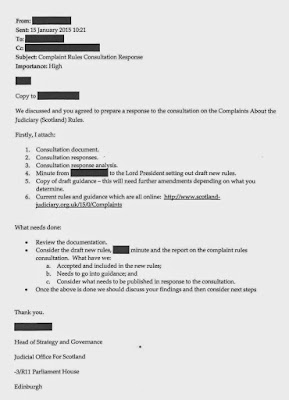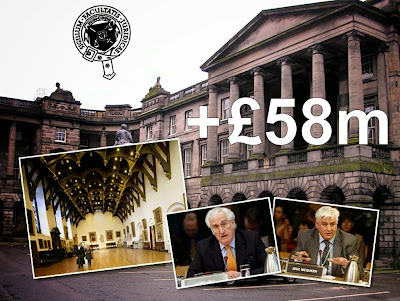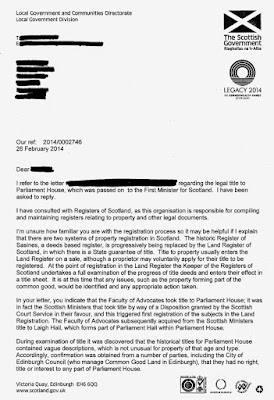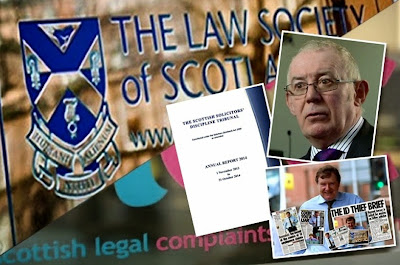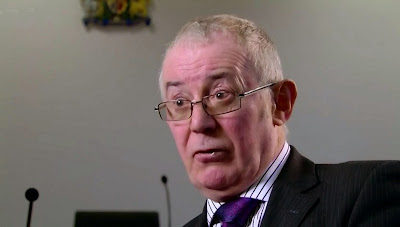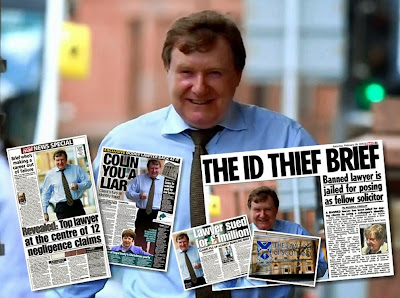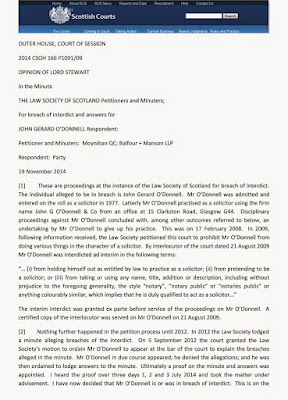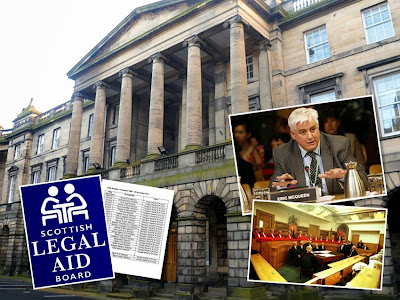 Legal Aid client poaching & hospitality racket in Scots Courts. LAWYERS accused of making suspicious, erroneous or fraudulent legal aid claims appear among a list of high earning legal aid law firms in a register of gifts & ‘hospitality’ received by staff at the Scottish Court Service (SCS).
Legal Aid client poaching & hospitality racket in Scots Courts. LAWYERS accused of making suspicious, erroneous or fraudulent legal aid claims appear among a list of high earning legal aid law firms in a register of gifts & ‘hospitality’ received by staff at the Scottish Court Service (SCS).
The documents, finally disclosed to journalists after court bosses failed to convince the Scottish Information Commissioner it should remain secret – identify ‘significant’ hospitality relationships between law firms who have received tens of millions of pounds of legal aid, local courts and court employees right across Scotland.
And it has emerged the extent of ‘hospitality’ to court staff is so great - some local courts have been the scene of ‘gift wars’ between law firms – with solicitors raising the stakes over rivals using hospitality to ensure business came their way at the expense of competitors.
The extent of gift giving in exchange for business referrals - raises questions over whether it is appropriate for court staff – who run the courts at taxpayers expense - to enter into hospitality relationships with solicitors who have a stake in dragging on court cases to beef up their fees and claims for legal aid.
And, some law firms on the list have been implicated in allegations of questionable legal aid claims. In other cases, law firms , activity resulting in criminal charges against staff.
In one case, the law firm of NS Lockharts Solicitors – run by Niels S Lockhart - a sole practitioner in Kilmarnock who was the subject of a Scottish Legal Aid Board investigation into huge sums of legal aid claims of over £600,000 in three years also appears in the list. NS Lockharts Solicitors are identified as providing hospitality to local court staff in Ayr Sheriff Court.
Lockhart ‘withdrew’ from the legal aid register after an investigation by the Scottish Legal Aid Board.
In another case of gift giving between lawyers on the legal aid ticket and court staff - the law firm of Bell & Co Solicitors are also identified as hospitality providers to staff at Kilmarnock Sheriff Court. However, Bell & Co hit the headlines two years ago when one of their Paralegals – Arlene Reid - was jailed for two years - for embezzlement and mortgage fraud totalling £87K after Reid defrauded her own employers and the Alliance & Leicester Building Society.
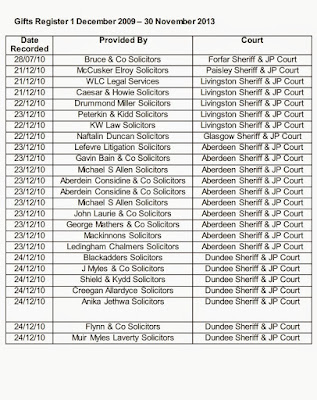 Gifts Register identifies Scots law firms ‘hospitality’ to court employees The list of law firms, together with a list of hospitality released by the Scottish Court Service identifies law firms who receive millions in taxpayer funded legal aid every year.
Gifts Register identifies Scots law firms ‘hospitality’ to court employees The list of law firms, together with a list of hospitality released by the Scottish Court Service identifies law firms who receive millions in taxpayer funded legal aid every year.
Hospitality on the list ranges from boxes of chocolates, alcohol, invitations to dinners with the ‘vested interests club’ - top lawyers, law firms, the Faculty of Advocates & the Law Society of Scotland, big business hosts & even “Royal Garden Parties”. Other hospitality include trips on boats, gift vouchers for high street stores, dinner parties with Police, and - bunches of flowers.
The extent of hospitality relationships between court staff and law firms have raised suspicions SCS staff are providing lawyers & law firms with personal favours in return, which in some instances are leading to criminal cases ‘taking their time’ through the courts owing to overly friendly relationships with local law firms & local court staff.
Information has also been provided to journalists – alleging undeclared financial relationships between court staff and law firms, in relation to the purchase of properties & land, provision of free or discounted legal services to SCS staff in their personal legal affairs, and instances of SCS staff providing return favours for solicitors when asked to do so.
Speaking to Diary of Injustice earlier today, a solicitor from a law firm which has provided small amounts of hospitality as a matter of courtesy and thanks to local court staff, said he was aware some law firms were offering additional gifts to SCS staff as a way of drawing in business. He described the situation as “unfair practice”.
The solicitor told DOI he was aware of several cases where court staff received discounted or free legal services – from law firms who were taking clients from others including his own firm.
Asked if he believed all hospitality provided to court staff was being declared, the solicitor replied: “No, it is not.”
And. in an example of law firms poaching each other’s clients using hospitality to court staff – DOI uncovered a case where ‘regular’ criminal legal aid clients of one law firm - were allegedly directed to another law firm by a court clerk in receipt of ‘hospitality’.
However, the switch did not result in a good move for the clients - who ended up jailed for minor criminal offences after a trainee solicitor from the law firm they were sent to – messed up their defences and pleadings.
Commenting on the documents, the Scottish Legal Aid Board said: “If there was ever any evidence that a solicitor providing legal aid had acted in an inappropriate manner in relation to the provision of legal aid we would investigate and, if appropriate, use the sanctions available to us under the legal aid legislation.”
In an earlier investigation by DOI, it was revealed Gillian Thompson OBE – now the Judicial Complaints Reviewer (JCR) – authored a report on undeclared relationships between employees of the Scottish Court Service, law firms, and other vested interests. The report, published by DOI – revealed court staff are making money on the side via relationships with law firms.
Diary of Injustice reported on concerns regarding hospitality involving Scottish Court Service employees where Ms Thompson was asked by the Scottish Court Service to investigate reports of irregularities in hospitality given to court staff. The request for the investigation came after the SCS received Freedom of Information requests regarding hospitality in the courts, prompting concerns some staff may have accepted gifts or hospitality but failed to register.
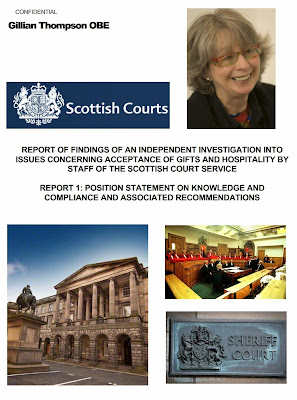 Report said SCS Registers were insufficient, and Court staff involved in private gain failed to declare. Gillian Thompson’s Report on Hospitality & Gifts in the SCS stated: “The information currently captured on the registers is insufficient to provide assurance that staff are using their common sense and considering issues such as conflict of interest.
Report said SCS Registers were insufficient, and Court staff involved in private gain failed to declare. Gillian Thompson’s Report on Hospitality & Gifts in the SCS stated: “The information currently captured on the registers is insufficient to provide assurance that staff are using their common sense and considering issues such as conflict of interest.
Ms Thompson went on to recommend the “SCS should revise the Policy on Acceptance of Gifts, Rewards and Hospitality to ensure that it is fit for purpose for all staff, taking account of the various roles performed within SCS. It may also be time to revisit the levels of value for gifts and hospitality.”
The former AIB’s report also revealed court staff were using their positions to earn money privately from their links with lawyers and law firms operating in courts, stating “Several staff raised the issue of sheriff clerks who carry out extrajudicial taxations and private assessments and who personally benefit financially from these activities.”
Ms Thompson’s report roundly condemned this practice, stating: “Not only is it inappropriate in terms of the civil service code requirements for staff who are public servants to be able to receive private gain from their employment it is also highly divisive when other staff see such benefits being derived from simply being in the right post of Auditor of Court within the Sheriff Courts.”
Ms Thompson recommended in her report the “SCS should bring the practice of sheriff clerks profiting privately from their employment by SCS to an end as quickly as possible”.
HOW COURT CHIEFS LOST HOSPITALITY INFORMATION BATTLE
The Scottish Court Service initially refused to release the gift register, claiming “the names of the gift or hospitality provider would be deemed as personal information” and “as the provider of the gift or hospitality was not made aware at the time that their name may be released, we consider disclosure of such is likely to bring the Scottish Court Service into conflict with the data protection principles.”
However, the request – from DOI – triggered a review of hospitality policy at the Scottish Court Service, leading to names of ‘'hospitality’ providers being added to the register.
Richard Warner of the SCS said: “I can advise you that due to your request for this information, the Scottish Court Service has changed the policy covering hospitality and gifts to ensure that the provider of any hospitality or gift are made aware that their name shall be entered on to our register and may be disclosed if requested in any future information request. This policy change shall take effect as from 1 January 2014 so the release of names may be considered in any future request for gifts or hospitality offered from this date. The policy also states that if the provider does not consent to their name being considered for release then the gift or hospitality cannot be accepted by a member of staff.”
After a request for review of refusal to disclose the information, the SCS again refused - this time around, claiming it would cost them too much to contact each law firm to ask permission to disclose their ‘hospitality’ to court employees. The SCS claimed they would have to contact every lawyer who gave a gift and this would cost too much to provide the information.
DOI journalists took the matter up with the Scottish Information Commissioner – who requested Courts Chief Eric McQueen provide an explanation as to why the courts were blocking release of information on hospitality relationships between the legal profession and court staff.
John Kelly, Freedom of Information Officer at the SIC said: “Having written to and discussed the matter with the SCS, without being required to do so by way of a formal Decision Notice, the SCS has agreed to provide you with the information requested, subject to redactions in terms of section 38(1)(b) of FOISA on the basis that to disclose some of the names of individuals would breach the first data protection principle of the Data Protection Act 1998 (the DPA). I understand that the names of Solicitor and Law Firms will be provided.”
After the intervention of the Scottish Information Commissioner, the SCS subsequently released the hospitality list to DOI.
Richard Warner for the SCS said: “Having reconsidered your request, and the SCS response, I now attach a list which indicates law firms where this information has been recorded. For the reasons stated in our earlier response this does not include the names of any individuals concerned as there could have been no expectation on their part that this information would be circulated or published widely. As indicated previously, steps are being taken to ensure that individual persons are made aware at the relevant time that their details made be released as a result of an information request.”

